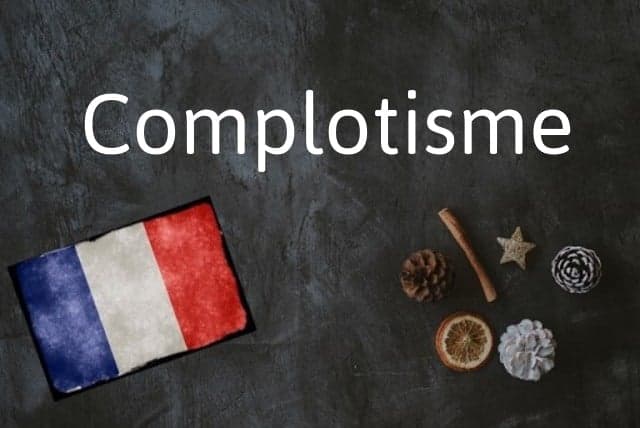French word of the day: Complotisme

It's not a new phenomenon, but it's on the rise in France (and elsewhere).
Why do I need to know complotisme?
Because it's increasingly becoming part of everyday debates.
What does it mean?
With the rise of social media and the increasing polarisation of politics, many countries have had to deal with more and more of their citizens believing in conspiracy theories.
In France, though, there is a single word to describe this phenomenon.
Le complotisme is the act of believing in, and spreading, conspiracy theories. It is particularly useful because people who believe in one conspiracy theory often believe in several. The people who are taken in by these theories are called complotistes (conspiracy theorists).
Conspiracy theories flourished in France during the pandemic, but there are plenty of other theories that pre-date Covid. A 2018 Ifop survey on behalf of the Jean Jaurès Foundation tested around a dozen common conspiracy theories, and found that 79 percent of French people believed in at least one of them.
Even some mainstream politicians are not above engaging in the odd bit of complotisme, especially at election time.
On a lighter note, the Twitter account Complots Faciles (easy plots) is a satirical account taking the mickey out of the grandioise and complicated world of the conspiracy theorist, with their trademark hashtag nous sachons (we know).
#NousChatons (redif) pic.twitter.com/BEd69WMuiG
— Complots Faciles (@ComplotsFaciles) May 31, 2023
"I'm not a conspiracy theorist, but this coffee clearly shows that a cat is going to blow up the world".
Use it like this
Il faut lutter contre le complotisme – We need to fight against conspiracy theories.
Le ministre a été accusé de complotisme – The minister was accused of believing in conspiracy theories.
Synonyms
Théorie du complot – Conspiracy theory
Infox – Fake news (although the English 'fake news' is often used in France as well)
Comments (1)
See Also
Why do I need to know complotisme?
Because it's increasingly becoming part of everyday debates.
What does it mean?
With the rise of social media and the increasing polarisation of politics, many countries have had to deal with more and more of their citizens believing in conspiracy theories.
In France, though, there is a single word to describe this phenomenon.
Le complotisme is the act of believing in, and spreading, conspiracy theories. It is particularly useful because people who believe in one conspiracy theory often believe in several. The people who are taken in by these theories are called complotistes (conspiracy theorists).
Conspiracy theories flourished in France during the pandemic, but there are plenty of other theories that pre-date Covid. A 2018 Ifop survey on behalf of the Jean Jaurès Foundation tested around a dozen common conspiracy theories, and found that 79 percent of French people believed in at least one of them.
Even some mainstream politicians are not above engaging in the odd bit of complotisme, especially at election time.
On a lighter note, the Twitter account Complots Faciles (easy plots) is a satirical account taking the mickey out of the grandioise and complicated world of the conspiracy theorist, with their trademark hashtag nous sachons (we know).
#NousChatons (redif) pic.twitter.com/BEd69WMuiG
— Complots Faciles (@ComplotsFaciles) May 31, 2023
"I'm not a conspiracy theorist, but this coffee clearly shows that a cat is going to blow up the world".
Use it like this
Il faut lutter contre le complotisme – We need to fight against conspiracy theories.
Le ministre a été accusé de complotisme – The minister was accused of believing in conspiracy theories.
Synonyms
Théorie du complot – Conspiracy theory
Infox – Fake news (although the English 'fake news' is often used in France as well)
Join the conversation in our comments section below. Share your own views and experience and if you have a question or suggestion for our journalists then email us at [email protected].
Please keep comments civil, constructive and on topic – and make sure to read our terms of use before getting involved.
Please log in here to leave a comment.